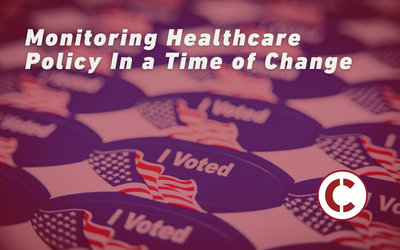
Monitoring Healthcare Policy In a Time of Change
With the election results in, Republicans have won the Presidency and secured majority control of both the Senate and House. This shift in political power means healthcare policy may experience changes over the next four years, potentially reshaping access, coverage, and costs for patients nationwide.
As the new administration prepares its priorities, patients with chronic conditions should closely track changes in key healthcare areas including Medicare and Medicaid coverage, Affordable Care Act protections, and access to services and treatments from vaccines to reproductive care. The policies of a second Trump administration, combined with a more conservative Congress, is likely to alter the landscape for chronic disease care and make state-level healthcare policy more important than ever.
Federal Shifts and the Rising Importance of State-Level Advocacy
Republicans' continued leadership of state legislatures and governor seats will continue to influence healthcare access and policies. Currently, Republicans control 23 state trifectas (both legislative chambers and the governor's mansion), and this stronghold is expected to remain stable as we head into 2025. Democrats have 17 trifectas, with the remaining 10 states reflecting a divided government.
These trifectas matter because states often fill the policy gaps left by federal policy. For instance, in states like Pennsylvania, where the GOP will reclaim full legislative control, we may see efforts to roll back Medicaid expansion, impose stricter eligibility requirements, or reduce access to treatments, all of which would affect people managing chronic diseases. Similarly, in states with veto-proof Republican supermajorities, like Kansas, Democratic governors' healthcare policies are less likely to make progress.
Key Federal Policy Changes to Watch
Patients with chronic conditions must stay informed about potential changes to the ACA, Medicare, and drug pricing.
Affordable Care Act: Insurers might regain the ability to create risk-based pools, which could drive up premiums for those with chronic diseases. Short-term health plans offering limited coverage may also resurface.
Medicare: The expansion of Medicare Advantage benefits, including telehealth, may continue, but structural changes could affect how seniors access care.
Drug Prices: While lowering drug costs remains a bipartisan goal, approaches like regulating pharmacy benefit managers (PBMs) could impact medication availability and affordability.
The Role of the Patient Voice in Influencing State-Level Policy
Regardless of the partisan shifts, we have learned time and time again that individual patients can help move state law by working directly with their legislators to solve local problems.
There are many ways for you to connect to local leaders, tell your story, and make a difference.
Visit our Call to Action page to advocate for key issues such as:
Our Chronic University series is also a great way to learn how to engage with legislators and get your story heard in front of decision makers. Visit our Chronic University series here, or check out these helpful videos below:
Your voice matters, and together, we can make sure chronic disease patients get the care they need.